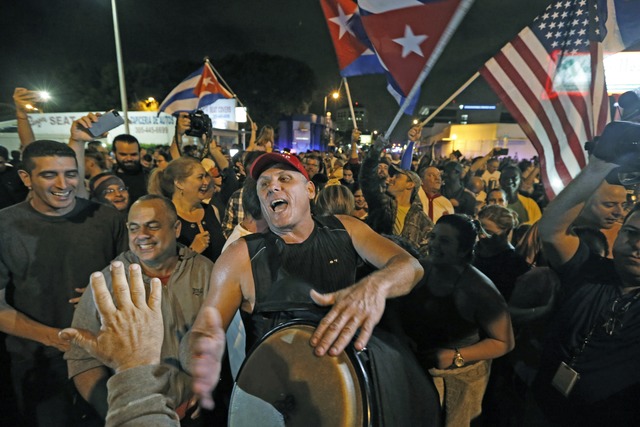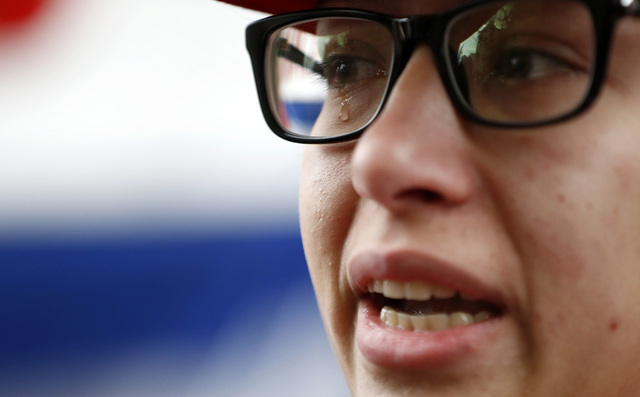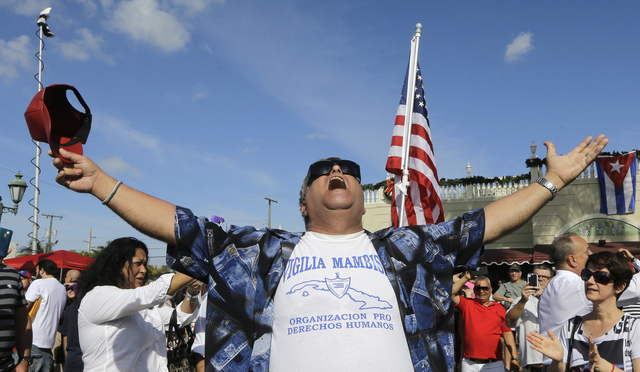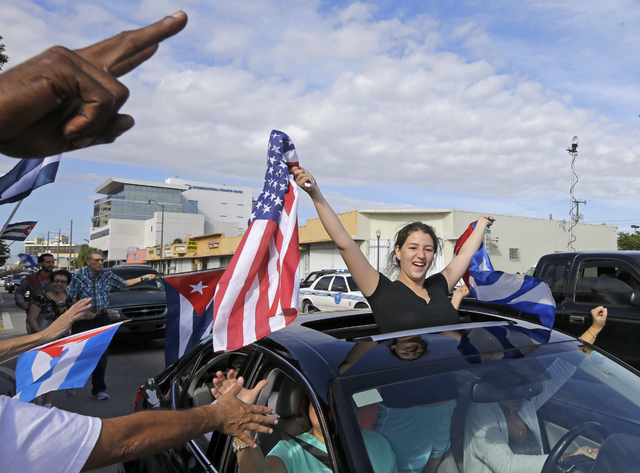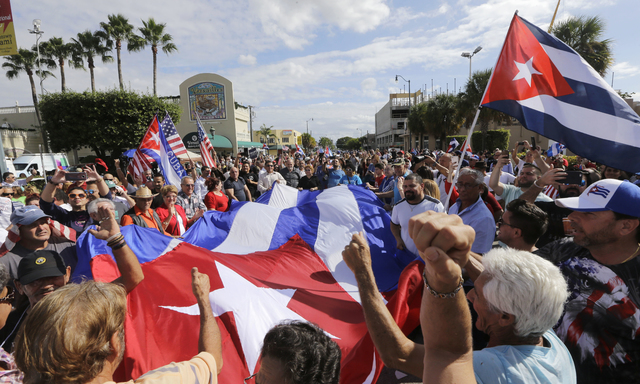Cubans in Miami celebrate Castro’s death, hope for change
MIAMI — Fidel Castro’s death triggered an emotional and long-awaited celebration in Miami’s large Cuban-American community Saturday as peaceful demonstrators waved flags and honked car horns, many cheering with joy and others weeping for family members who didn’t live to see this day.
Yet it was also a bittersweet time as most realize Castro’s passing will not immediately translate into freedom or democracy on the oppressive communist island and that much work remains to enact change in Cuba.
“We need for the people of Cuba to have the freedom we have in the U.S., but this changes nothing. There won’t be change until the people revolt,” said Juan Cobas, 50, who came to the U.S. from Cuba at age 13.
Others saw Fidel’s death as a sign that a generation that has ruled Cuba for nearly 60 years is passing from the world stage, many noting that his brother, current President Raul Castro, is 85.
“I’m feeling this is the beginning of the end,” said Alex Pineiro, 32. “Fidel was the architect of what’s going on. It’s a mix of emotions, I’m happy he’s dead, but I’m celebrating hope.”
Within hours of the announcement early Saturday of Castro’s death at age 90, thousands of people banged pots with spoons, waved Cuban and U.S. flags in the air and whooped in jubilation on Calle Ocho — 8th Street, and the heart of Little Havana. Honking horns and strains of salsa music from car stereos echoed against stucco buildings, and fireworks lit up the humid night sky.
Police blocked off streets leading to Cafe Versailles, the quintessential Cuban-American hotspot where strong cafecitos — sweetened espresso — were as common as a harsh word about Fidel Castro.
“Cuba si! Castro no!” they chanted, while others screamed “Cuba libre!”
Celebration, not grief, permeated the atmosphere. Castro has cast a shadow over Miami for decades, and in many ways, his policy and his power have shaped the city and its inhabitants.
“We’re not celebrating that someone died, but that this is finished,” said 30-year-old Erick Martinez, who emigrated from Cuba four years ago.
There were no reports of violence or any arrests during the demonstrations, Miami police spokeswoman Kenia Fallat said Saturday. Miami-Dade County officials said there were no plans to activate the emergency operations center — another sign of the more subdued reaction to Castro’s death than might have previously been expected.
“They are celebrating but in a very peaceful way,” Fallat said of the demonstrators.
The U.S. Coast Guard was running regular patrols and not increasing staffing levels or taking other emergency steps, said Petty Officer Jonathan Lally. The Coast Guard has seen a sharp uptick in Cubans attempting to arrive in Florida by sea, with at least 7,411 Cubans attempting to migrate over the Florida Straits in the fiscal year that ended Sept. 30 compared with 4,473 in the same timeframe last year.
Cubans fled the island to Miami, Tampa, New Jersey and elsewhere after Castro took power in 1959. Some were loyalists of Fulgencio Batista, the president prior to Castro, while others left with the hope they would be able to return soon, after Castro was toppled. He never was.
Some tried for years to find a way to remove Castro by force, including the failed CIA-backed Bay of Pigs invasion in 1961. Rafael Torre, 80, took part in that battle and wore a “Bay of Pigs Veteran” shirt to Saturday’s demonstration.
“We tried for more than 50 years but couldn’t do it. Now he’s dead, and maybe things can change,’ Torre said. “It might take three or four years. Maybe the revolution will be on the streets in three or four months.”
Many others believed they would never be free under Castro and his communist regime. Thousands left behind their possessions, loved ones, and hard-earned educations and businesses, traveling to the U.S. by plane, boat or raft. Many Cubans died on the ocean trip to South Florida.
The ones that made it to Miami took a largely, and vehemently, anti-Castro stance.
“He should not be revered. He should be reviled,” said U.S. Rep. Ileana Ros-Lehtinen, a Republican who was born in Cuba.
Some people said the election of Donald Trump as president could lead to a tougher stance against the Havana government that might hasten change.
“I hope that Trump takes a hard line against the Castro regime,” said Henry Marinello, 60, who left Cuba as a child in 1961,
On New Year’s Eve every year, Cubans in Miami utter a toast in Spanish as they hoist glasses of liquor: “Next year in Cuba.” But as the Cuban exiles aged, and as Castro outlived them, and as U.S. President Barack Obama eroded the embargo and younger Cubans returned to the island, the toast rang silent in many households.
News of Castro’s death was long anticipated by the exiles. Rumors have come and gone for decades, and Castro’s death had become something of a joke. This time, though, it was real.
“We’re all celebrating, this is like a carnival,” said 72-year-old Jay Fernandez, who came to Miami when he was 18 in 1961 after he was jailed twice by the Cuban government. He and his wife and another woman held up a bilingual sign he’d made four years ago when Castro first became ill. “Satan, Fidel is now yours. Give him what he deserves. Don’t let him rest in peace.”
Several blocks away, at the Bay of Pigs memorial, Antonio Hernandez, 76, rode his bicycle up in a light rain and stood at the eternal flame that honors the men who tried to wrest Cuba from Castro’s grip.
“Everybody’s happy. Now this guy won’t do any more damage,” said Hernandez, who came to Miami on the Mariel boat lift in 1980. “His brother will now go down, too. But the world has to pay attention to this, not just we Cubans.”
Many Cubans made successful livings and raised families in Miami despite having to learn a new language and start their lives over. Exiles who arrived as teenagers with no money in their pockets became millionaires, political leaders, clergy members and teachers.
Gabriel Morales, a 40-year-old financial executive, monitored social media early Saturday from his home in Miami. His parents both left Cuba decades ago. His father left Cuba before Castro took over, and then returned to visit during Castro’s regime. He vowed never to return until the regime changed, Morales said.
Morales’ mother left after Castro assumed power; her family had their property taken by the government, Morales said.
“Feels weird,” Morales said in a text message to an Associated Press reporter. “Been waiting to hear this news all my life. Seems unreal.”



